Casino Bonus CA surveyed the history of all summer-released blockbusters and found the top 10 that made the most money domestically using The Numbers.
This item is available in full to subscribers.
We have recently launched a new and improved website. To continue reading, you will need to either log into your subscriber account, or purchase a new subscription.
If you are a current print subscriber, you can set up a free website account by clicking here.
Otherwise, click here to view your options for subscribing.
Please log in to continue |
|
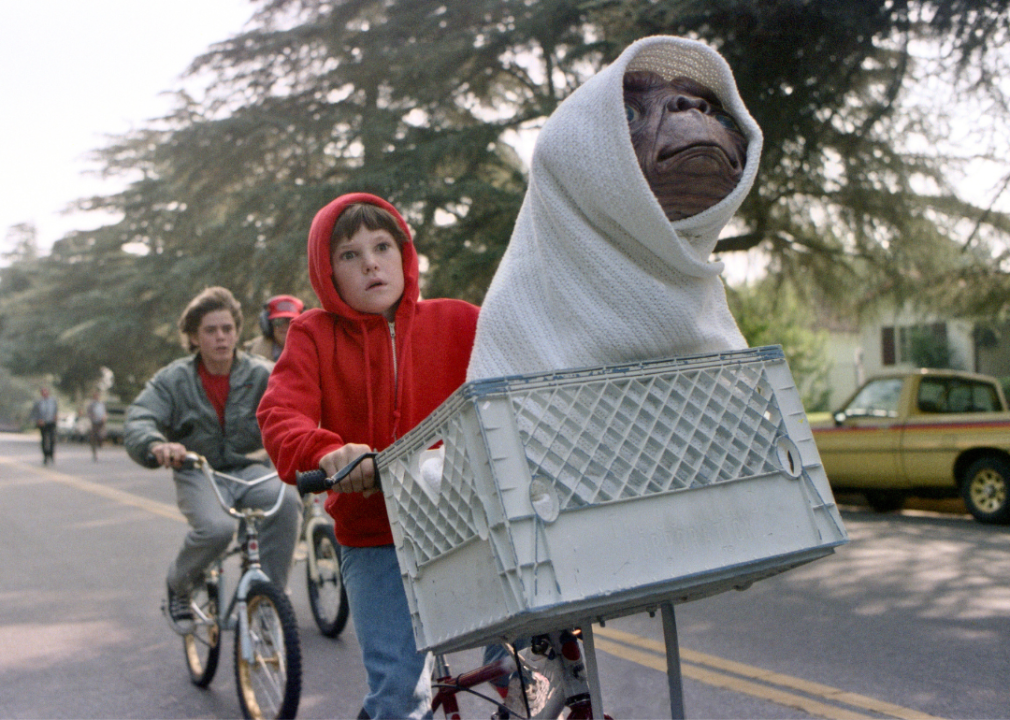
The birth of the summer blockbuster started with some low bass notes and a terrifying dorsal fin. On June 20, 1975, Steven Spielberg's "Jaws" hit theaters and scared everyone out of the ocean. The movie, about a great white shark that terrorizes a small beach town, dominated the box office, laid the template for high-concept filmmaking, and inspired studios to think differently about the months of May through August rather than reserve it for lower-priority movies.
Two years later, George Lucas followed Spielberg's lead, releasing the first of his "Star Wars" movies on Memorial Day weekend. The gigantic hit all but confirmed the summer as the perfect time for studio executives to showcase epic, mainstream movies. Over the next decade, the pair of filmmakers continued their summer dominance and influenced the entire industry to take advantage of the season, which became a moneymaker for adventure flicks (the "Indiana Jones" trilogy), sci-fi thrillers (the "Alien" franchise), and kid films ("Gremlins" and "The Goonies") alike.
As Hollywood continued to evolve, the summer blockbuster took over the entire year's release calendar. It's easy to forget that "The Matrix" came out in March, "Harry Potter and the Sorcerer's Stone" and many of its sequels dropped around Thanksgiving, and Marvel's 2018 superhero picture "Black Panther" surprised audiences in February, a month typically reserved for forgettable action movies.
The reason? With shifting media and audience preferences, studios doubled down on making stronger bets with more expensive movies (while pushing out independent, smaller-budget offerings), and a designated four-month window became too crowded to make a necessary splash. Today, without the same diversity of options, every season feels like summer.
Going back to the release of "Jaws," Casino Bonus CA used data from The Numbers to survey the history of all summer-released blockbusters, compiling the top 10 movies that made the most money and ranking them by their all-time domestic box office, adjusted for inflation to 2023 dollars. May through August is considered the summer release zone for this list, with the exception of "Avengers: Endgame," which premiered at the end of April 2019 but still made the majority of its box office over the summer.
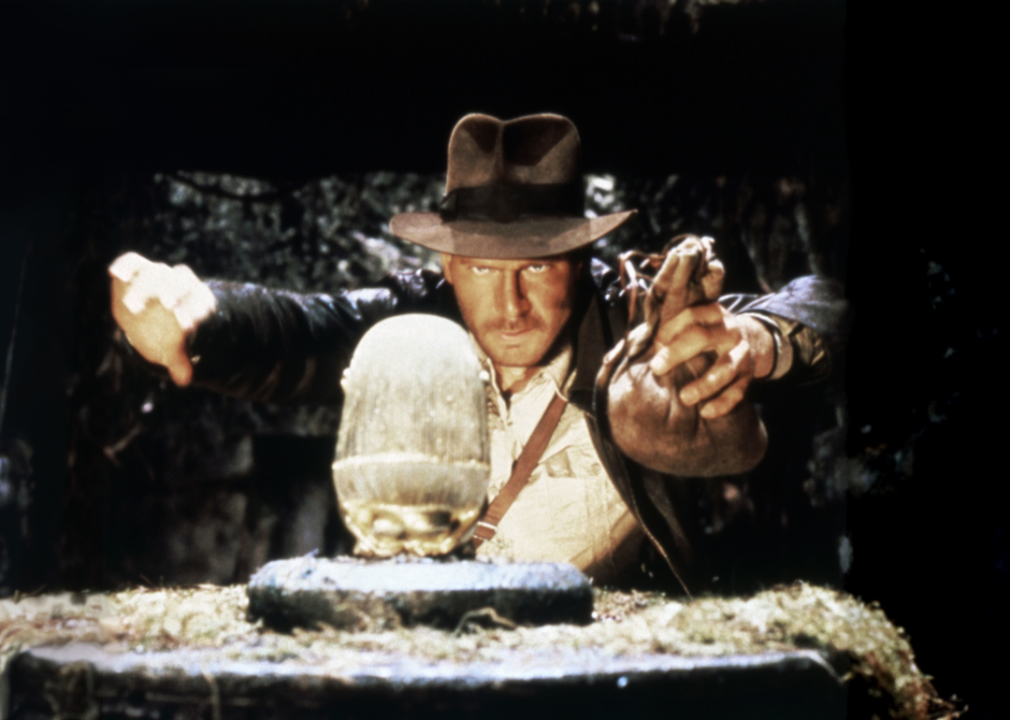
- Director: Steven Spielberg
- Inflation-adjusted box office: $855,830,948
- IMDb user rating: 8.4
- Metascore: 86
The opening of "Raiders of the Lost Ark" introduces us to Indiana Jones—wearing his fedora, jacket, and bullwhip—in an iconic silhouette. Soon enough, however, Spielberg's superlative, globe-trotting hero is on the move, evading all kinds of hidden obstacles and traps in his pursuit of an ancient artifact. The kinetic start—filled with close calls and getaways—laid the template for Harrison Ford's adventurous archaeologist, who embarks on a dangerous mission to find a powerful religious relic before the Nazis get their hands on it.
After breaking out as Han Solo in the "Star Wars" franchise, Ford pivoted seamlessly from a galaxy far, far away to Peru's spider-heavy jungles and Cairo's snake-filled deserts. The movie's considerable box office receipts spawned an initial trilogy, along with a spinoff television series, two more sequels, and an entire subculture of fans obsessed with Indy's weathered fedora.
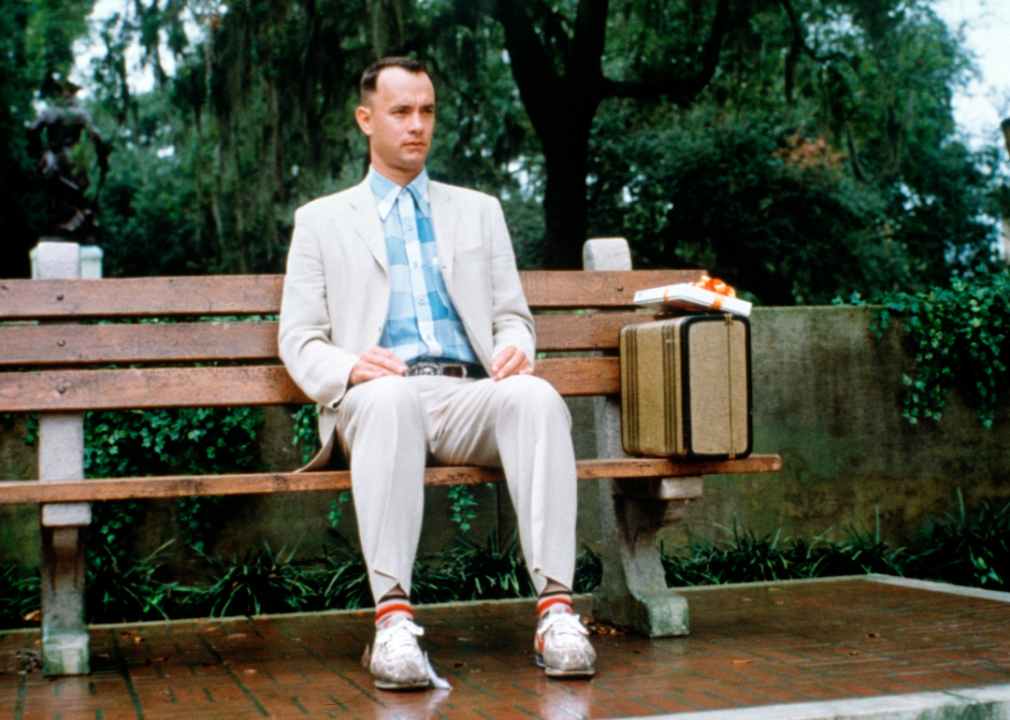
- Director: Robert Zemeckis
- Inflation-adjusted box office: $866,499,720
- IMDb user rating: 8.8
- Metascore: 82
"Life is like a box of chocolates. You never know what you're gonna get." The most quotable line of "Forrest Gump" tends to define Zemeckis' titular character, an Alabaman with an intellectual disability who manages to surprise everyone he meets. Played by Tom Hanks, Forrest is raised by a supportive mother (Sally Field) and develops a lifelong friendship with Jenny (Robin Wright). As he grows up, he unwittingly and serendipitously becomes a participant in some of America's most historical and culturally significant moments, all while remaining steadfast in his love for Jenny, whose own struggles interweave with his heartwarming and unlikely journey.
A rare critical and commercial success, "Forrest Gump" topped the box office in its opening July weekend, then again two weeks later, a third time in August, and a fourth and fifth time for two weeks in September. The movie eventually took home six Oscars, including Best Picture. It remains lauded as a rare blockbuster that leaned into the country's divisive past with a nostalgic, feel-good perspective.
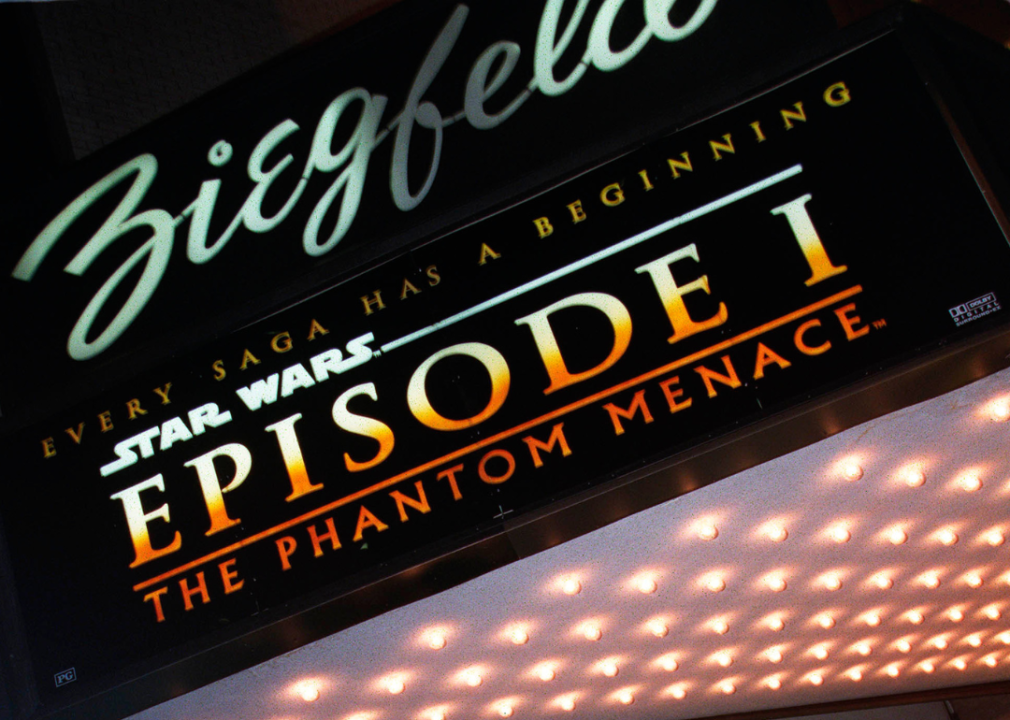
- Director: George Lucas
- Inflation-adjusted box office: $973,562,724
- IMDb user rating: 6.5
- Metascore: 51
One of the most anticipated movies of all time, "Star Wars: Episode I - The Phantom Menace" both revived and expanded Lucas' intergalactic world—and it still polarizes fans a quarter century later. Set roughly 30 years before the original, the prequel starts the origin story of Anakin Skywalker (Jake Lloyd), who would eventually grow to father Luke Skywalker and become Darth Vader. At 9 years old, he comes under the protection of Jedi master Qui-Gon Jinn (Liam Neeson) and his apprentice Obi-Wan Kenobi (Ewan McGregor), attempting to repair their ship on Tatooine and end the Trade Federation's blockade of the planet Naboo.
Though it became the second-highest grossing film in history for a time, the movie gained a reputation as being the worst of the franchise (no thanks to certain characters containing racist tropes), letting audiences down after 16 years of waiting for a new installment. It was the first window into the more sadistic side of the fan base, but recent "Star Wars" television series like "Obi-Wan Kenobi" and "Ahsoka" have recontextualized "The Phantom Menace" and put its initial shortcomings into greater nostalgic relief.
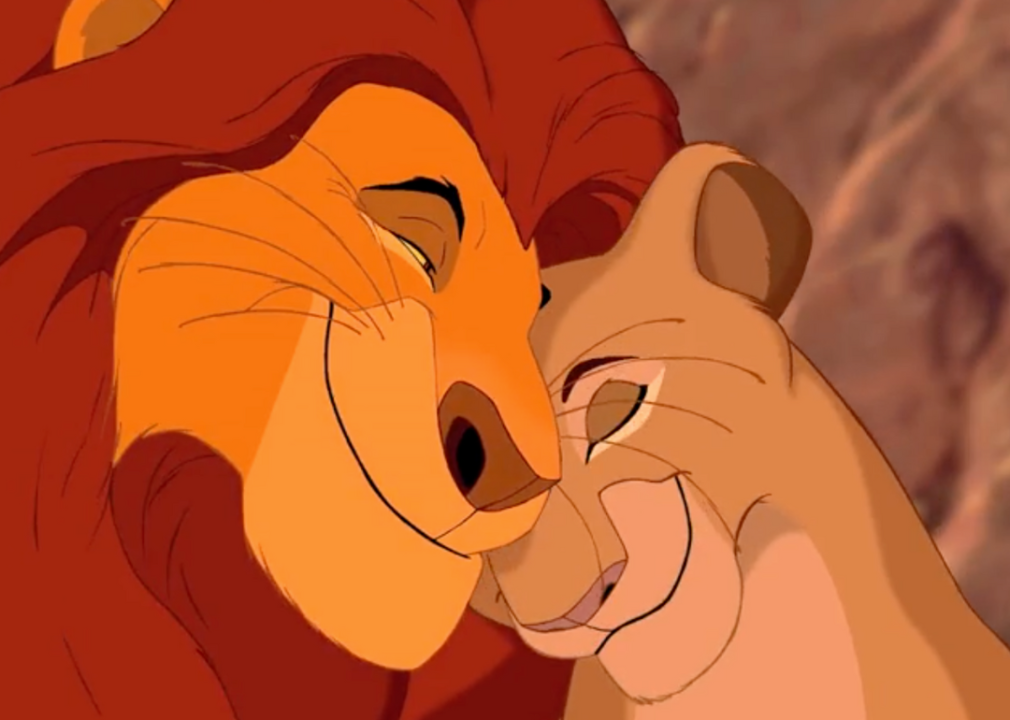
- Directors: Roger Allers, Rob Minkoff
- Inflation-adjusted box office: $979,252,839
- IMDb user rating: 8.5
- Metascore: 88
"The Lion King" started out as an afterthought. When co-directors Roger Allers and Rob Minkoff began working on it, Jeffrey Katzenberg, then-head of Disney's motion pictures division, relayed to the media his enthusiasm for "Pocahontas" (simultaneously in production) and barely considered the potential for the studio's African epic.
Katzenberg didn't realize what he had on his hands: a towering animated achievement about Simba (voiced by Jonathan Taylor Thomas and Matthew Broderick), a royal lion cub who grows up to avenge the death of his father Mufasa (James Earl Jones) by challenging his uncle Scar (Jeremy Irons) for the throne.
With a score from Hans Zimmer and song contributions from Tim Rice and Elton John, "The Lion King'' roared at the box office and has endured the test of time. Its three-decade legacy now includes some animated sequels, a long-running Broadway show, countless toy lines and memorabilia, and a 2019 photorealistic remake that has its own sequel on the way.
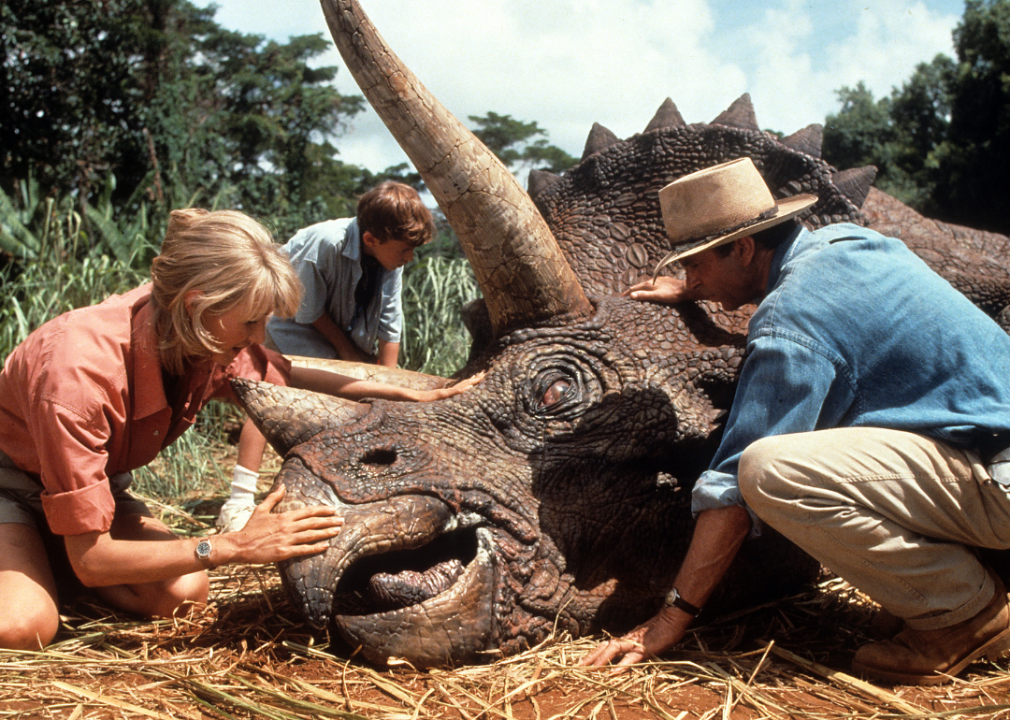
- Director: Steven Spielberg
- Inflation-adjusted box office: $1,003,158,330
- IMDb user rating: 8.2
- Metascore: 68
After "Jaws," "Raider of the Lost Ark," and "E.T.," Spielberg quickly became the king of the summer blockbuster—and by 1993, he had figured out the perfect formula for another one. "Jurassic Park," based on Michael Crichton's eponymous novel, capitalized on the enduring appeal of dinosaurs. It stars Sam Neill, Laura Dern, and Jeff Goldblum as a trio of scientists invited to an island theme park filled with dinosaurs, which have been recreated using ancient DNA. Despite the insistence of the park founder (Richard Attenborough) that the facility is safeguarded, chaos erupts when some of the carnivorous species break free and begin hunting humans.
The movie didn't have a typical "dino-mite" first weekend, earning almost $50 million, but its overall success can be attributed to staying in theaters for more than a year. As a result, two sequels followed in 1997 and 2001, before a 2015 reboot, "Jurassic World," started another trilogy—not to mention a variety of theme parks, attractions, video games, television series, and comic books.
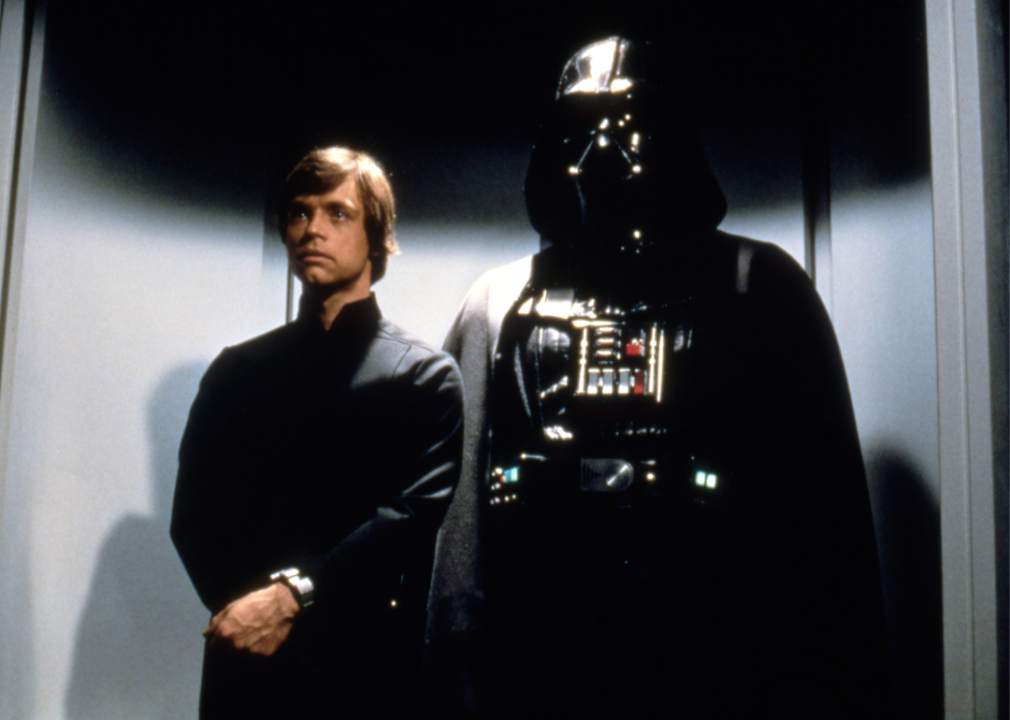
- Director: Richard Marquand
- Inflation-adjusted box office: $1,009,821,373
- IMDb user rating: 8.3
- Metascore: 58
The final installation of Lucas' trilogy culminates in a battle between good and evil.
As Yoda nears death, Luke Skywalker (Mark Hamill) learns that Leia (Carrie Fisher) is his twin sister and is determined to defeat Darth Vader (James Earl Jones) to finish his Jedi training. After he, Leia, Han Solo (Harrison Ford), and Chewbacca (Peter Mayhew) weaken the new Death Star's shield, Luke hands himself over to the Imperial army but resists Vader's and Emperor Palpatine's attempts to seduce him to the dark side, leading to a confrontation that ends with the deaths of both Sith lords. Soon, the Rebel Alliance destroys the Death Star's main reactor, exploding the spherical ship and restoring balance in the universe.
The fiery conclusion earned $23 million in its opening weekend and earned a Special Achievement Oscar for its visual effects. Though some critics have called it the worst entry of the original trilogy, its visual splendor and climactic battles fed enthusiasm for a prequel trilogy 16 years later.
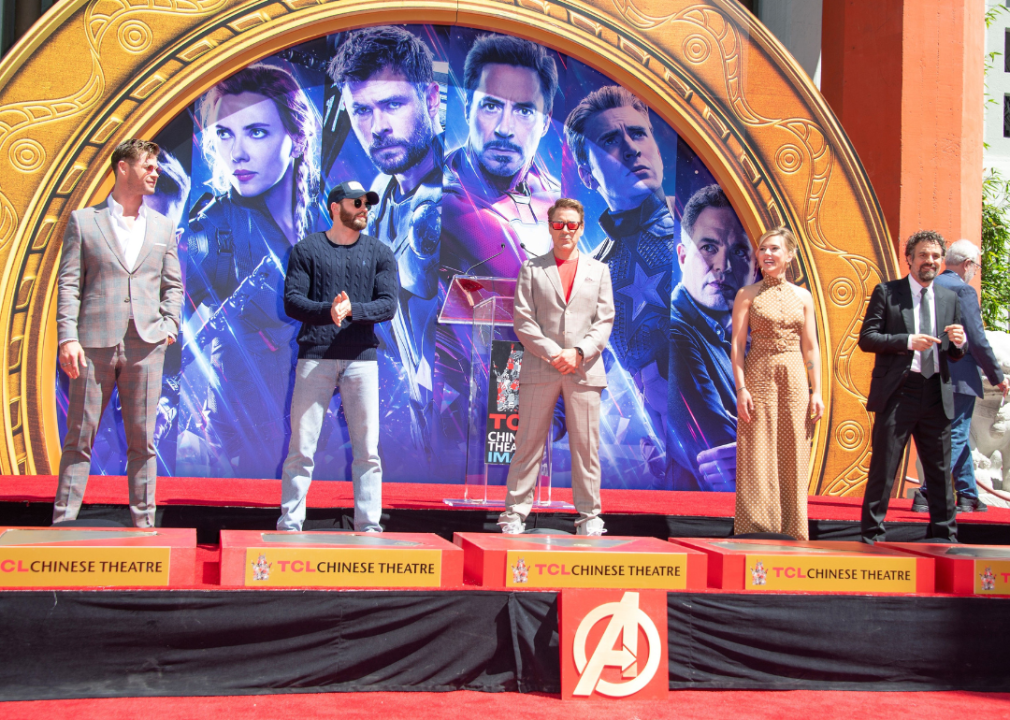
- Directors: Anthony Russo, Joe Russo
- Inflation-adjusted box office: $1,010,181,328
- IMDb user rating: 8.4
- Metascore: 78
It's hard to have a monocultural moment in today's media landscape, but "Avengers: Endgame" might be one of the last blockbusters to achieve that distinction. After 11 years of buildup within the Marvel Cinematic Universe, the final chapter and culmination of this epic superhero collaboration became a must-see event.
The movie picks up after Thanos has eliminated half the planet with one snap. The remaining members of the Avengers—including Iron Man (Robert Downey Jr.), Thor (Chris Hemsworth), Black Widow (Scarlett Johansson), Captain America (Chris Evans), and the Hulk (Mark Ruffalo)—must pool their resources and determine a way to take down the purple demigod and return those who vanished.
The Russo brothers' epic made a whopping $357 million over its first late-April weekend alone, staying in theaters until mid-September. Five years later, it's considered both the peak of Marvel's dominance and the start of a downslide for the company, which struggled to maintain its commercial success as it contends with superhero fatigue.
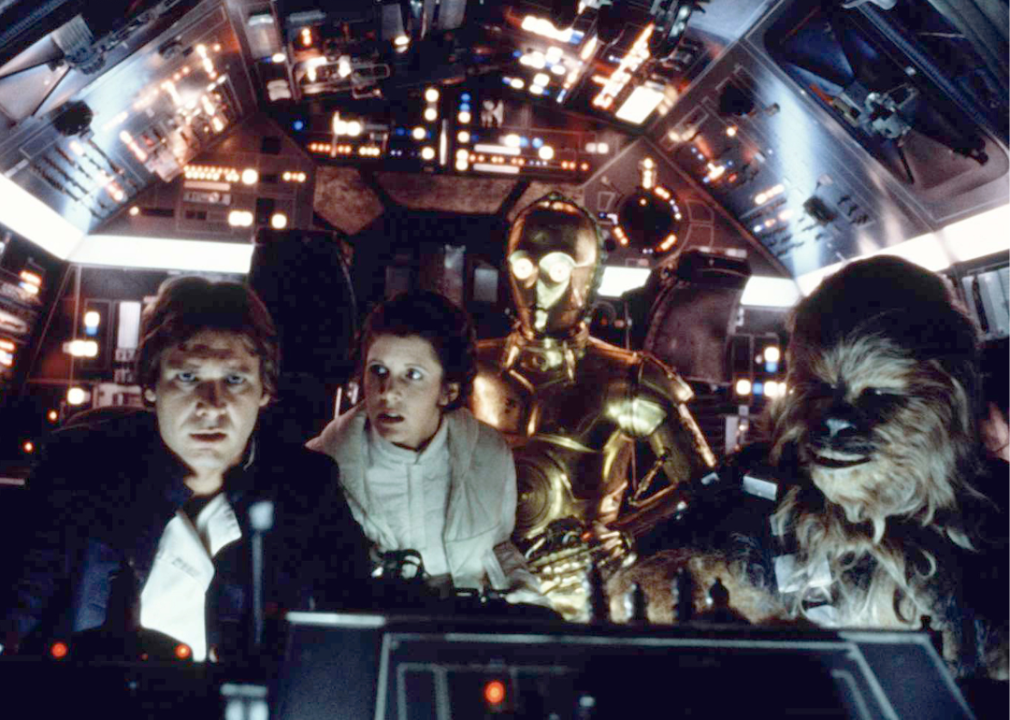
- Director: Irvin Kershner
- Inflation-adjusted box office: $1,191,447,782
- IMDb user rating: 8.7
- Metascore: 82
Hailed as one of the greatest sequels of all time, "The Empire Strikes Back" had a lot of pressure to up the ante three years after "A New Hope" shot audiences into its imaginary universe. Tapping deeper into "the force," the movie chronicles Luke's apprenticeship under Jedi master Yoda (Frank Oz) on the swamp planet Dagobah, where the green humanoid alien teaches him to resist the negative emotions pulling him to the dark side. This leads to a showdown with Darth Vader, who delivers the revelation that he's actually Luke's father and attempts to persuade his son to rule the galaxy with him. But the young Skywalker refuses his offer and narrowly escapes his death with help from Leia.
Even with the addition of new characters and worlds, the film's noticeably dark and dour ending subverted expectations—to the delight of audiences. Despite not making as much as its predecessor, it became the highest-grossing movie of the year and the gold standard on which all sequels were compared.
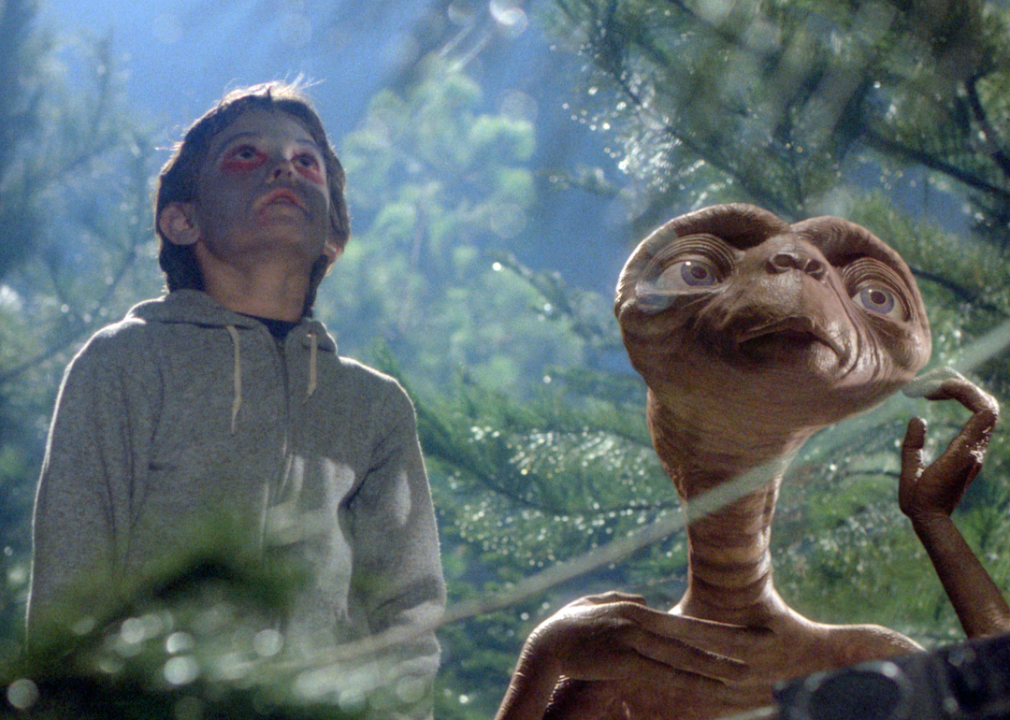
- Director: Steven Spielberg
- Inflation-adjusted box office: $1,453,084,096
- IMDb user rating: 7.9
- Metascore: 92
"E.T. the Extra-Terrestrial" tells the story of a docile alien who gets stranded on Earth but is befriended by Elliott (Henry Thomas), a young boy living in suburban California. Together with his brother (Robert MacNaughton) and little sister (Drew Barrymore), they take care of "E.T." and keep his existence a secret until the intergalactic creature becomes sick, leading the government to intervene and threaten their life together.
Spielberg's childhood classic closed out the 35th edition of the Cannes Film Festival and became the highest-grossing film of the 1980s. Though it never bore a sequel, the movie's unique and innocent point of view can be felt throughout pop culture, most notably in the Netflix series "Stranger Things," a sci-fi thriller centered around the nostalgia of the 1980s and told through the eyes of adolescent kids.
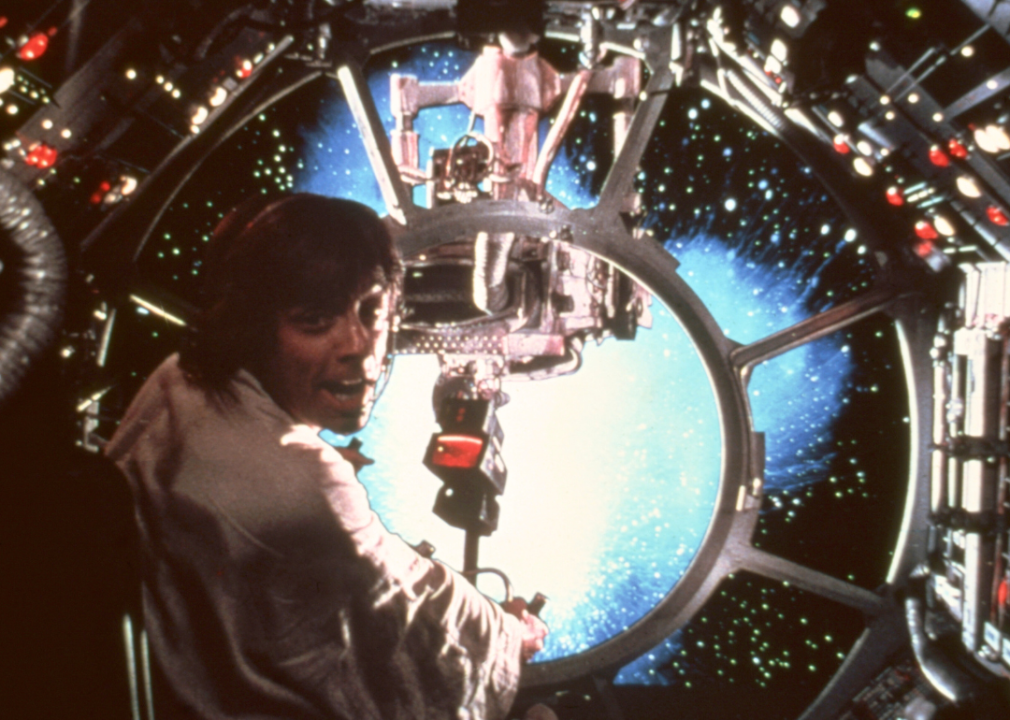
- Director: George Lucas
- Inflation-adjusted box office: $1,771,490,282
- IMDb user rating: 8.6
- Metascore: 90
From the opening trumpet blast, yellow-colored crawl, and dazzling Star Destroyer that slowly emerges onto the screen, it was clear the original "Star Wars" would change movies forever. Lucas' visionary saga begins with Imperial forces—led by the imposing Darth Vader—taking Princess Leia hostage to thwart a rebellion against the Galactic Empire. Along with the friendly droid duo R2-D2 (Kenny Baker) and C-3PO (Anthony Daniels), Luke Skywalker and Han Solo team up to rescue Leia and aid the Rebel Alliance.
In addition to creating a host of intriguing characters, species, and planets, the movie obliterated the box office (after only delivering a $1.5 million opening weekend) and sparked a massive fandom that hasn't ceased to diminish. The movie's universe has only expanded since, including two sequels and two further trilogies, along with a host of spinoff movies and television series that filled out a galaxy Lucas could have only dreamed about when he conceived his hero's journey.
Data reporting by Luke Hicks. Story editing by Carren Jao. Copy editing by Tim Bruns. Photo selection by Michael Flocker.
This story originally appeared on Casino Bonus CA and was produced and distributed in partnership with Stacker Studio.